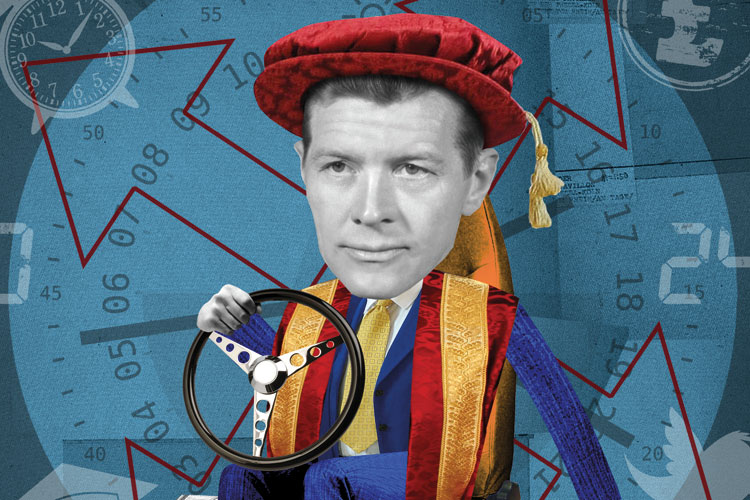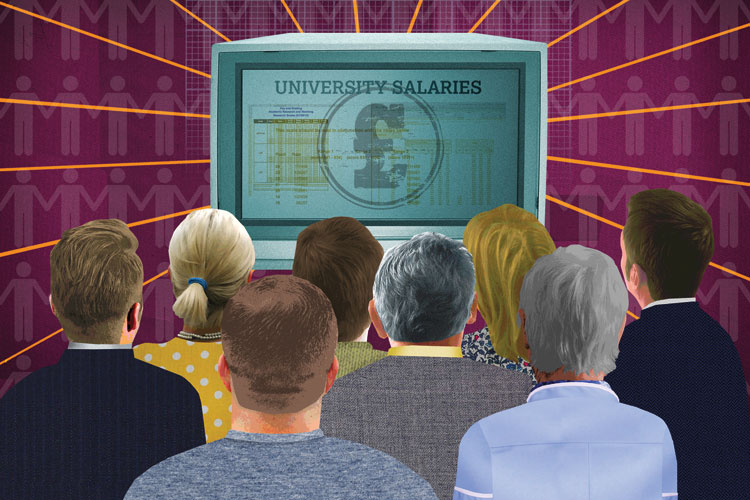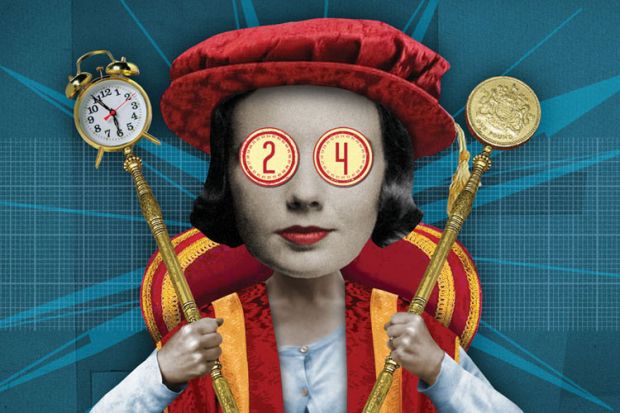Vice-chancellors are often scorned by the rank and file both for their dizzyingly high salaries and their alleged obsession with rankings, benchmarking and strategy. But are their priorities and modi operandi really so different from those their underlings would adopt if they were presented with the keys to the largest office on campus and a membership card for the Athenaeum Club?
To find out, we asked five academics to set out what they would do if they were made vice-chancellors for the day.
One prominent issue they would face is what time to get up. Stephen Curry would rise early to enforce a broader vision of academic purpose, and Emma Rees would compose a tweet that reduced the Queen to tears even before she had finished her breakfast. But Russell Foster would presumably enjoy a good lie-in before setting about implementing his programme to boost academics’ cognitive capacity by encouraging them to get more sleep.
Jenny Pickerill would be at her desk no earlier than 9am to implement her measures to prevent academics from working ludicrous hours, such as by permitting emails to be sent only during working hours even if they were written outside them.
Contributors seem to be agreed on the importance of restoring to their universities a sense of the academy as a community of equals. Both Rees and Pickerill would take steps to address gender imbalances, Robert Zaretsky would cut administrators’ bloated salaries and job titles down to size and several contributors would seek to make students a more integral part of the system. To facilitate this, Curry would donate half his pay to schemes to promote staff-student interaction, and Pickerill would limit her remuneration to 10 times that of the lowest-paid university employee. Rees, on the other hand, would implement a somewhat ad hoc measure to bag herself a pay rise and a flashy Audi. But after she’d brought about the abolition of tuition fees and a reduction in the price of university orange juice, who could seriously argue that she didn’t deserve it?

I would take only half my salary and use the rest to create two funds
I would rise early. This is likely to be a busy day, and a tough one: there’s no point kidding myself that there are easy fixes in this business.
Any university worth its salt is already striving for quality in all it does within the constraint of limited resources. But UK universities are complex organisations operating in austere times and buffeted by intense national and international competition for funds, staff and students. Increasingly, institutions have to survive in a system that works by numbers – income, outputs, impacts and student satisfaction – and they appear to be succumbing to a new strain of corporate managerialism as a coping mechanism. In shifting currents, it can be hard to keep everyone focused on the big picture.
My goal would be to loosen the Gordian knot, pulled tighter in recent years as the metricisation of academic life has been tensioned against the instrumentalism brought on by the hike in undergraduate tuition fees. To do this, I would set out to rediscover the original conception of the university – as a community of teachers and scholars – and to place a renewed emphasis on its societal role. This requires a focus on the major assets of the institution: its people. The first, and major, step in my short tenure would be to charge departments and faculties to discuss the San Francisco Declaration on Research Assessment, a document sadly neglected in UK academia. The principal aim of Dora is to reduce the perverse effects on research assessment that have been brought about by over-reliance on journal impact factors as a way of judging the work and worth of individual researchers.
But I would use discussion about Dora as a starting point for articulating and committing to a fuller set of principles of assessment that recognise achievement across the entire spectrum of research, teaching and public engagement (in societal, cultural and commercial spheres), as well as administrative and managerial activities. These activities interact strongly, but are too often seen to be in opposition to one another, especially given the long-standing curse of academic life: the job is never done. The only way to productive synergism is to recognise and reward all aspects of the job.
This would be a hard task but two things are key to success: information and communication – which are clearly interlinked. Some degree of measurement and evaluation is inevitable to capture costs and income, workload profiles, the quantity and quality of teaching and research contributions, and so on. However, information gathering also demands a network of continuing conversations between different groups in the university: academics, technicians, postdocs, librarians, administrators, managers, undergraduates and postgraduates. Consensus is not likely to be achieved but such conversations (supported by the radical step of creating undifferentiated common rooms) should foster a shared perspective on the university’s challenges and aims, and of how best to support staff and students to achieve these.
To signal my own investment in this mission, I would take only half my salary and use the rest to create two funds. (This would still leave me with a six-figure sum to take home – I’m not a fool.) One would be for staff to allocate to student enrichment projects, such as (off the top of my head) summer research projects, conference attendance or the establishment of their own seminar series. The other would be for students to allocate to fund outreach, educational or research initiatives proposed by staff. These might include things as diverse as site visits, staff-student social events, practical demonstrations in lectures or a 3D printer to create models useful for teaching.
Although I would be sorely tempted, it would not be practical for me to withdraw the university from the league tables that have sprouted across the globe to rank institutions on the basis of questionable performance measures and an inbuilt undervaluation of education. But as vice-chancellor I would insist that all public announcements by the university of its rank in such tables be accompanied by a restatement of our determination to be judged by the goals and standards that, as a community, we have set for ourselves.
The repetition of this message would be a powerful signal to the world that we are an institution of bold, self-confident staff and students with the independence of mind to steer according to a broad vision of academic purpose.
Stephen Curry is professor of structural biology at Imperial College London.

Sleep is frequently the sacrificial lamb to professional and social demands
At its core, a university should be a forum where individuals meet to generate new ideas and share every kind of knowledge – which is then communicated to wider society to help promote health and wealth and to allow individuals to make informed decisions about the world they live in. Few, I suspect, would disagree with such sentiments. Why, then, do most universities pay such little regard to the aspect of our biology that best enhances our cognitive capacity to put them into practice?
I refer, of course, to sleep. And if I were vice-chancellor for the day, my principal act would be to implement a measure to make sure that academics get enough of it.
I am not unaware of how urging students and academics to sleep would be viewed by the cynical, but please hear me out. Shakespeare encouraged us to “enjoy the honey-heavy dew of slumber”, and his fellow dramatist Thomas Dekker urged us to “consider what an excellent thing sleep is...that golden chain that ties health and our bodies together”. Yet universities – in common with society more widely – have instead concurred with Thomas Edison, who described sleep as “a criminal waste of time, inherited from our cave days”.
Sleep, frequently the sacrificial lamb to professional and social demands, is viewed as an indulgence. In reality, the time we spend asleep is an investment. Good sleep is critical in memory formation, problem solving and exam success. It reduces stress, anxiety, depression and even psychosis. Sufficient sleep encourages social interaction and even enhances a sense of humour, while reduced sleep promotes the excessive use of stimulants and sedatives, such as caffeine and alcohol, and the increased consumption of sugar-rich foods. The consequences of long-term poor sleep are severe, creating an increased risk of hypertension, cancer, Type 2 diabetes and mental illness.
Yet poor sleep is a growing and frequent problem among university students and staff. As vice-chancellor I would make sure all employees and students were educated about sleep and its function, and that occupational health services were trained in how to go beyond just prescribing sedatives when approached by staff and students with sleep problems.
Our level of alertness depends, in part, on our body clock. However, there is considerable individual genetic-based variation, depending on whether we are a morning person or an evening person (a “lark” or an “owl” respectively). Understanding your “chronotype” allows you to plan your day effectively, working and teaching when your alertness and therefore productivity are highest. To support this, I would introduce flexitime as a standard clause in academic contracts, and introduce a policy of no staff meetings before 10am or after 4pm. Surely anything that made meetings more constructive, empathetic and capable of arriving at a decision would be a good thing?
To discourage people from working excessive hours I would also follow some parts of the commercial sector in discouraging emails after 11pm. Staff who sent emails routinely between 11pm and 7am would be contacted by occupational health. I would also provide affordable, site-specific, on-demand daycare. The daily sleep loss and subsequent stress inflicted on staff and infants at both ends of the day should not be an inevitable consequence of having young children.
From the ages of approximately 10 to 21, people are biologically programmed to stay up later and sleep later. Often dismissed as laziness, this is actually part of a developmental change. So, to ensure that students get the most out of their educational experience, I would prohibit lectures and exams from being scheduled before 11am, but I would permit them to run later in the day, taught by flexitime owls. Such measures have been shown to improve academic performance and well-being.
But many adolescents postpone their bedtimes further by engaging with social media and playing video games long into the night. In “my” university, good sleep education for students would include advice regarding such activities, and professional help if they became addictive and students’ sleep was disrupted.
An inappropriately aligned body clock leaves us feeling nauseous, unfocused and fatigued, but light both resets our body clock and promotes alertness. It is therefore essential that we receive sufficient light at the right time of day. In addition to disseminating advice regarding how to seek out natural light, I would ensure that all working spaces, both new buildings and existing facilities, were appropriately illuminated with natural or artificial light.
How would I know if my injunctions were being taken seriously? I envisage walking down any corridor and checking that notices on sleep health occupied as much space as those on substance misuse, sexual health, diet and how to protect your bicycle from theft. And how could the university afford to implement my programme? Easy. Happy, energetic and more creative staff would generate increased grant income, be more productive and for longer, generate more intellectual property, teach better and communicate more effectively across all sectors, promoting broad support for the institution.
Students would also be happier, better educated and more successful. Such experiences would encourage increased applications, and as successful citizens, graduates would be more inclined to donate and provide endowments to their alma mater. Our finance director – like everyone else in the institution – could sleep easy.
Russell Foster is professor of circadian neuroscience and director of the Sleep and Circadian Neuroscience Institute at the University of Oxford.

For every white, male member of staff hired, the university would also have to hire a woman
Even before I arrived for my day’s work as a vice-chancellor I’d tweet about my abolition of tuition fees for University of Chester students. My argument would be so pithy and persuasive (140 characters, in fact) that complete financial support for all Chester undergraduates would instantly be made available by my many followers in Whitehall. I’d call these new means-tested payments “grants”.
Female students at my university outnumber men by almost two to one, so the first thing I’d do on my arrival in the office would be to decree that for every white, male member of staff hired, the university would also have to hire a woman with equivalent qualifications and give her equivalent power. And for every white member of staff hired, there would be one minority employee hired, so that the staff body would be radically changed. In this way, black and minority ethnic, disabled, transgender, gay and female students could see their ambitions and potentials reflected in powerful people who looked just like them (or, at least, like slightly older versions of them).
Still championing equality and diversity, I would bring the local community into the university by offering small local charities premises on campus at peppercorn rents. Staff and students would be actively encouraged to work with these charities, bridging the town-gown divide in a meaningful way.
I would make it a contractual requirement that every member of the senior management team must clock up the academic equivalent of pilots’ flying hours. They would have to sit in on no fewer than a dozen seminars and lectures from across the range of disciplines every single academic year. They would also need to spend at least one weekend each year shadowing a lecturer to understand something about academics’ work-life balances. Furthermore, I would ensure that every staff member, academic and support alike, would have a meaningful annual period of time in which to think: simply to cogitate, without the noisy clutter of anxious feelings about committee meetings, publication outputs, teaching preparation, overtime, assessment or impact. This fully paid hiatus could last anything from a week to a month, depending on time served (and good behaviour).
By now it would probably be lunchtime. My tuition fees tweet would have been retweeted so many times that other vice-chancellors across the country would be slowly shaking their heads and weeping in admiration of my chutzpah. They would immediately atone for their own complicity in the higher fees policy and petition the government for grants for their own students.
As I began to digest my lunch, I would summarily dismiss, on a charge of odious mutiny, the staff member who, when consulted on where the apostrophe should go on the labels for the new bottles of vice-chancellor’s wine, replied: “There isn’t an apostrophe, just an ‘h’ in ‘wine’.” And, on the subject of drinking, I would launch an immediate inquiry into how a plastic jug of university orange juice (from concentrate) can cost £7 when Morrisons (bereft of its own rightful apostrophe) charges only £2.50 for a litre bottle of freshly squeezed.
As the day began to dwindle into twilight, I would ask the ground staff to fashion a small and verdant paddock alongside the canal. Here, I would stable my many hobby horses. The shrewd observer would identify one for each of these transgressions:
- Scholars who, in an ostensibly ad hoc manner, purposefully and doggedly use obfuscatory discourse in their writing.
- Colleagues who don’t refill the departmental kettle after having poured out its last drips into a mug that they haven’t washed since the research excellence framework results came out.
- Anyone who ever uses the word “trope”.
- Students who persist in using the archaism “whilst” even though I’ve told them repeatedly that it should be “while”.
- The Kardashians.
By now, even the most right-wing politicians would have been moved by my tweet and would join with other MPs and civil servants from across the spectrum in petitioning the Queen formally to abolish tuition fees. She’d agree, while dabbing penitent tears from her eyes with a small lace handkerchief that had once belonged to Anne Boleyn.
And, although I’m a republican, my last act would be to decree that any staff member with the same initials as Her Majesty’s royal cipher (familiar to anyone who still posts letters) should automatically be given a 50 per cent pay rise and a company Audi R8 V10.
Emma Rees is senior lecturer in English at the University of Chester. She would like to make it crystal clear that any resemblance in this piece to any vice-chancellors, living or dead, is purely coincidental.

I would start by publishing everyone’s pay, from the top to the bottom
Precarity, unmanageable workloads and pay inequalities are not unique to universities, but they are issues that unduly affect the health, families and life of many staff. If I were a vice-chancellor for a day I would tackle pay and workloads.
I would start by publishing everyone’s salary, from the top to the bottom. Transparency would add pressure to justify disparities and would enable analysis of gender pay gaps, of whether basic wages amount to a living wage, and what differences there are between administrators and academic staff. Using those data, I would close the gender pay gap by topping up women’s salaries, and I would ensure that all staff were at least on a living wage, including those on temporary or external contracts. I would also ensure that my own salary – assuming it was the highest in the institution – was no more than 10 times that of employees on the lowest wage.
Paying fair wages also requires an end to hourly employment. I would ensure that all staff have either an annual salary or a daily rate, and any contract would have a minimum duration of 12 months. This would particularly impact on those with casual teaching posts, who would effectively become part time, with teaching consolidated into certain days and with salaries that more realistically reflected the time it takes to teach and mark. If someone could convince me that we needed people on full-time teaching-only contracts at all, I would make them all permanent, with a clear internal career path. Finally, a good pay scale works only if people can get promoted. I would rewrite the criteria for promotion as a clear checklist of achievements, and make the full minutes of promotion committee discussions available to all candidates.
Even if pay is fair, workloads often aren’t. Overworking is endemic at universities, and early career academic staff can feel that the only way to survive and progress is by working 60+ hours a week. Those who work long hours can excel or make themselves unwell, but this culture of overworking is also exclusive and leads to the loss of some great staff with disabilities, relationships or caring responsibilities.
Universities have a duty of care to ensure that workloads are sustainable. While it is not possible to physically stop people working, and changing a work culture takes time, expectations can be asserted through policies. Staff should work only a 37-hour week and take all their allocated holiday. Although flexibility can appeal to academics, too much flexibility makes our jobs endless. Staff would still be permitted to access and write email out of hours (evenings and weekends), but their messages would be sent only during weekday working hours (9am to 5pm). This would not stop staff working, or enjoying the flexibility, but it would help signal the expectation that it is important to have time off work.
I would also set a standard staff-to-student ratio across all departments and fund the recruitment of enough staff to achieve it, thereby ensuring teaching workloads were sustainable. Research time is crucial for all academic staff, but new lecturers are often faced with a difficult first few years as they balance developing a research trajectory, writing brand new teaching material and building competency in university systems. Only the lucky few start with a research fellowship. Therefore, I would give new lecturers a reduced teaching and administration load for their first five years.
Crucially, if the only way to reduce workload were to employ others (such as more professional service staff and research assistants), I would insist that these additional posts be made available – and be paid as outlined above.
Perceptions of workloads are often related to a mutual misapprehension on the part of professional services, academic staff and students as to what the others actually do. To help overcome this, and to generate more mutual respect, I would encourage all staff to job shadow someone in a different role for a day once a year.
Mutual understanding would also be improved if students were included in more aspects of the university, including research and organisational committees. These bright, typically young people often have brilliant ideas, fresh perspectives and useful questions. A bit more transparency, openness and equality would go a long way to improving our universities and their staff’s daily lives.
Jenny Pickerill is professor of environmental geography at the University of Sheffield.

To chip away at the wall that divides the administration from academics and students, I would teach one course every year
Let me say, first, that I’d never belong to any university that would have me as its president. If in some alternative universe, however, there were such a university, I suspect that I’d morph into Esposito, the revolutionary leader in Woody Allen’s Bananas. A dedicated and humane man, he becomes a monster upon taking power in a small Latin American country. In his victory speech, he declares that Swedish will be the country’s official language and that all citizens will be required to change their underwear every half hour (and that it must be worn on the outside so that the state can check).
Such errant behaviour is not inevitable, though. It certainly isn’t apparent in the administration at my own university – at least, that is, if you overlook the strange mix of motivational babble and public relations balderdash that has become our official language, and the fact that all citizens are boldly encouraged to wear red, the official school colour, on Fridays (on the outside, obviously, so that the administration can check).
Still, keeping in mind the lesson of Bananas, here are a few projects I’d pursue were I my university’s president. First, I would establish a new tradition: University Unplugged. During the first week of class, all first-year students would be required to spend a set number of hours in the library. As if in a literary version of the television series Lost, they would be stripped of their electronic devices and, armed instead with an index card and pencil stubs, be led into a distant stack and told to find a certain number of books. Clues for the titles of some of the books could only be found in the bibliographies and endnotes of other books. This exercise would build our students’ physical stamina and intellectual confidence; it would also build towards my personal goal to never again hear from graduating students that the only time they ever entered the library was to borrow a laptop.
I would open a second front in the battle for literacy on campus by presenting professional contracts to our American football and basketball players. This is, I realise, a subject as alien to UK readers as cricket rules are to American readers. Let me explain.
The term “student athlete” is a clever neologism coined by the National Collegiate Athletic Association to camouflage the rot at the heart of their system. It allows universities to recruit youths with exam scores that are half that of the other students. This creates, in turn, the peculiar institution of hideaway curricula, phoney courses and systemic hypocrisy that debase universities’ ballyhooed academic “visions” and damage the athletes’ vision of their own worth. In effect, young men – overwhelmingly African American and desperately unprepared for academic work – are invited to batter one another on football gridirons for the glory of their alma mater and the improbable opportunity to secure a professional contract. But should a player be injured, his university will claw back his athletic scholarship, slap him on the back and wish him all the best.
Let us, then, put an end to the lie of “student athlete” by paying them a living wage, providing them with insurance and making studying for a degree merely optional.
Next, I would turn to deprofessionalising my administrative team. One lie even more egregious and persistent than the notion of the student athlete is that faculty salaries are behind skyrocketing tuition fees. In fact, all the evidence suggests that it is down to the metastatic growth of administrative positions. We have wrought a Borgesian world of administrative chieftains whose titles – from assistant vice-provost for global initiatives to senior vice-provost for system initiatives – are as baroque as they are opaque, and whose sole raison d’être seems to be little more than bureaucratic aggrandisement.
To chip away at the wall that divides the administration from academics and students, I would teach one course every year. During my quarter century as a professor, I’ve been fortunate to work under two deans for whom teaching and “deaning” are complementary, not contradictory, activities. Rather than being a distraction from administration, teaching is actually a cure for abstraction.
Finally, I would also make a point of eating lunch or at least taking a coffee at one of the campus cafes or food stands. Sure, it would be symbolic – but symbols matter, especially when there are no camera-armed PR assistants ready to turn them into photo opportunities. What could be more inspiring than to glimpse the president chatting with a student while standing in line for a bagel and a coffee? Except, perhaps, a president quietly reading a book or doing a crossword while waiting in that same line – or simply staring into the distance, lost in thought.
Robert Zaretsky is professor of history in the Honors College, University of Houston. His most recent book is Boswell’s Enlightenment (Harvard University Press, 2015).
后记
Article originally published as: Boss for a day (11 June 2015)




